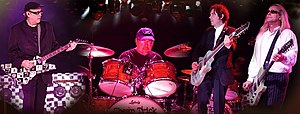
Back تشيب تريك ARZ Cheap Trick Byelorussian Чийп Трик Bulgarian Cheap Trick Czech Cheap Trick German Cheap Trick Greek Cheap Trick Spanish Cheap Trick Estonian Cheap Trick Finnish Cheap Trick French
Cheap Trick | |
|---|---|
 Cheap Trick in concert at the Chumash Casino Resort in Santa Ynez, California (2005) | |
| Background information | |
| Origin | Rockford, Illinois, U.S. |
| Genres | |
| Years active | 1973–present |
| Labels |
|
| Spinoff of | Fuse |
| Members | |
| Past members |
|
| Website | cheaptrick |
Cheap Trick is an American rock band formed in Rockford, Illinois in 1973 by guitarist Rick Nielsen, bassist Tom Petersson, lead vocalist Robin Zander and drummer Bun E. Carlos.[a][3] Their work bridged elements of '60s guitar pop, '70s hard rock, and the emerging punk rock sound, and would help set the template for subsequent power pop artists.[4]
Cheap Trick released their self-titled debut album in 1977 and, later that year, found success in Japan with the release of their second album, In Color. 1978's Heaven Tonight included the power pop classic "Surrender". The band achieved mainstream popularity in the United States in 1979 with the triple-platinum live album At Budokan and a Top 10 single, a live recording of "I Want You to Want Me".[5] They followed with Dream Police (1979), their most commercially successful studio album, reaching No. 6 on the Billboard 200 chart.[6] After struggling with declining popularity and lineup changes in the 1980s, Cheap Trick experienced a major resurgence toward the end of the decade when they topped the US charts with the power ballad "The Flame".
The band has continued releasing new music into the 21st century and maintains a constant touring schedule, having performed live more than 5,000 times since their formation.[7] Cheap Trick have sold more than 20 million albums[8] and built a dedicated cult following. Their influence has been cited by a diverse range of rock artists from both the mainstream and underground.[9] The band was inducted into the Rock and Roll Hall of Fame in 2016. The current lineup of the band consists of Zander, Nielsen and Petersson.
Cite error: There are <ref group=lower-alpha> tags or {{efn}} templates on this page, but the references will not show without a {{reflist|group=lower-alpha}} template or {{notelist}} template (see the help page).
- ^ Cite error: The named reference
auto1was invoked but never defined (see the help page). - ^ Braun, Georgette (September 4, 2013). "3 Cheap Trick members countersue original drummer". Rockford Register Star. Rockford, Illinois. Retrieved January 18, 2014.
- ^ Curry, Corina. "Cheap Trick: 'New guy' Daxx Nielsen has known bandmates his whole life". Rockford Register Star.
- ^ Erlewine, Stephen Thomas. "Biography". AllMusic. Retrieved December 27, 2022.
- ^ Dome, Malcolm (June 28, 2016). "The top 10 best Cheap Trick songs". Classic Rock. Retrieved April 11, 2023.
- ^ "Dream Police Billboard Albums". AllMusic. Rovi Corporation. Retrieved November 15, 2011.
- ^ "Cheap Trick: 'We don't want to do wimp versions of ourselves'". USA Today. March 29, 2016.
- ^ "Cheap Trick's lead singer Robin Zander set to rock The Ranch". Naples Daily News.
- ^ Cite error: The named reference
autowas invoked but never defined (see the help page).